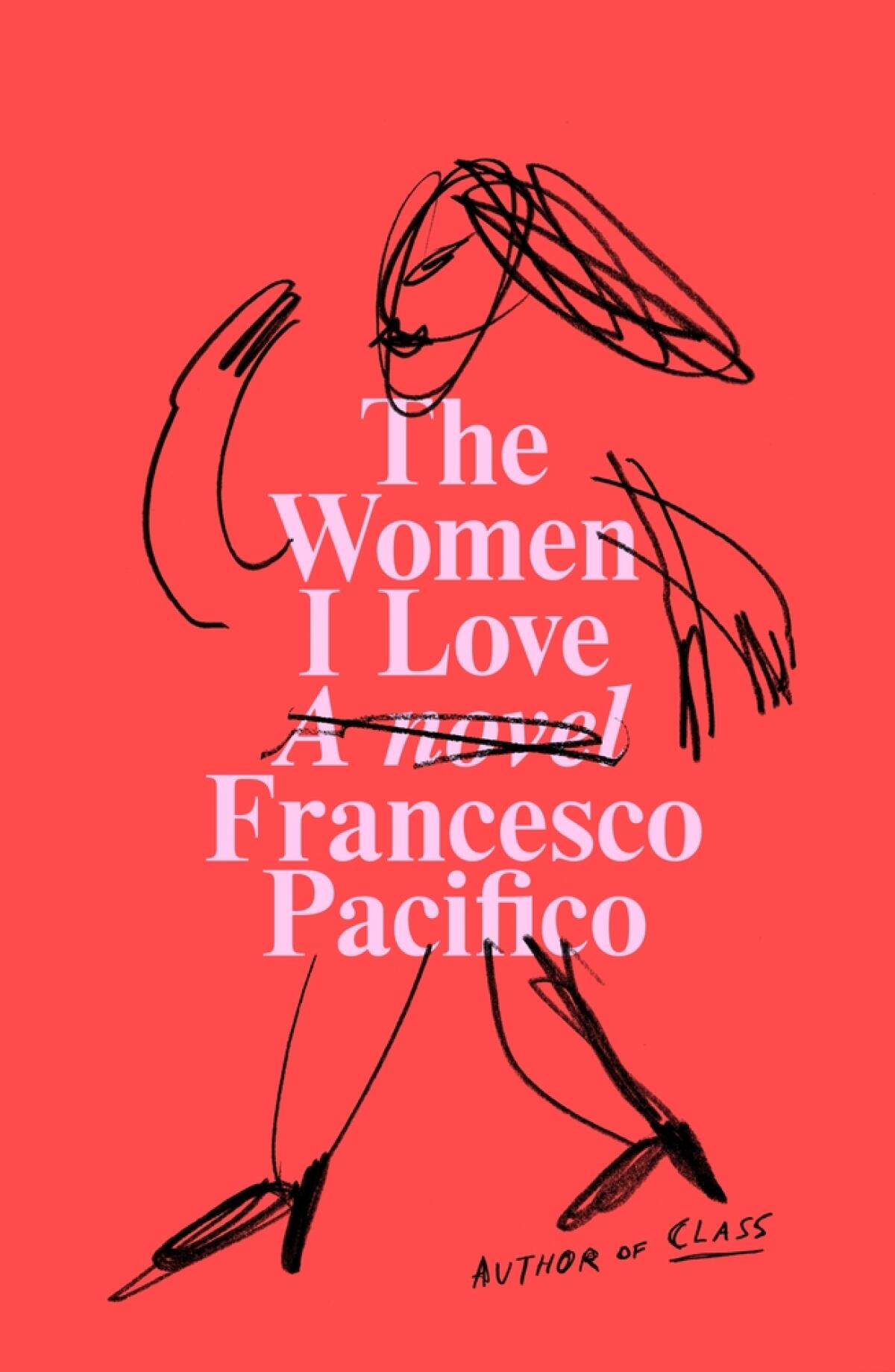Review: A satirical novel of male narcissism too accurate to be any fun

On the Shelf
The Women I Love
By Francesco Pacifico
Translated by Elizabeth Harris
FSG: 240 pages, $27
If you buy books linked on our site, The Times may earn a commission from Bookshop.org, whose fees support independent bookstores.
The protagonist of Francesco Pacifico’s “The Women I Love” is writing a novel, and he has this to say about his literary project: “I’m recalling this period in my life to see if I’m capable of describing the women I love or have loved without turning them into caricatures, into saviors or sirens, into wives, mothers, or whores. I’ve grown tired of the comedy of the clumsy man who always makes the wrong move.” Later, he wonders, “what’s left for a man to write when he’s writing about women?”
The narrator, Marcello (a clear nod to the journalist in Fellini’s “La Dolce Vita”), works in publishing and has produced a few collections of poetry. His father is wealthy, so even though his career isn’t particularly lucrative, he lives a comfortable, almost lavish lifestyle.
The book is divided into five sections, each named after one of the women in his life. The first focuses on a young editor with whom he has a brief affair. Next, his girlfriend and eventual wife, Barbara. Third, his aspiring novelist sister-in-law. Fourth, his estranged sister, Irene. Finally — of course — his mother.
‘Trust’ is the third Starnone novel to be translated by American novelist Lahiri, after ‘Ties’ and ‘Trick,’ forming a powerful trilogy on self-deceit.
The plot follows Marcello through a few years in his life. He changes jobs, moves from Rome to Milan, breaks up with and then reconciles with Barbara, reconnects with his sister, fights with Barbara again, gets jealous of a successful writer he’s convinced Barbara is sleeping with and drinks copious amounts of alcohol. Since he’s an editor, he occasionally interrupts the narrative with bracketed commentary about the novel he’s writing — which is the novel we’re reading. For instance, after the scene in which he meets and flirts with Barbara, he interjects: “[I don’t like long, drawn out stretches of dialogue (as an editor, it just feels like a cheap way to add on pages), but I have to make an exception when it comes to the card game of seduction.]”

Although Pacifico’s language, fluidly and effectively translated by Elizabeth Harris, is lovely and his sense of dramatic momentum is strong, Marcello isn’t a compelling character. “The Women I Love” aims to satirize “the neurotic, obsessive, childish point of view of the typical male narrator.” We know this from its tone and also because these are Marcello’s words; he is walking us through his own pitfalls even as he insists he is avoiding them.
And that’s exactly the problem. The novel duplicates the voice it ironizes, operating as if the self-aware meta-commentary makes up for its lack of depth or new insights. Those introspective monologues about men writing about women function like stage winks, trapping Marcello between being a well-drawn character and representing a certain type of character. Marcello is Rothian through and through, a self-involved artist more interested in contemplating “a man’s carelessness toward women” than he is in actually caring about them.
Characters in fiction needn’t be moral paragons; in fact, such figures would bore us. But what are we to do with those we simply don’t like? It’s easy to object that Marcello is meant to be unlikeable, that this is the whole point. He typifies masculinity in the contemporary moment and thus his behavior reflects this. True enough, but formal justifications don’t factor into one’s relationship to a character, especially a narrator.
A new novel from the pseudonymous author of the Neapolitan quartet is a fascinating, slightly off-balance tale of coming of age in ’90s Naples, Italy.
After a bitter fight with Barbara (precipitated by his wholly unjustified jealousy), Marcello drunkenly goes over to the apartment of the young editor, Eleonora, and sexually assaults her. It is a bleak and distressing scene, in which he describes “Ten thrusts inside her, deeper, deeper, about ten times, and her saying, not violently, only asking, not loudly, only saying, ‘Come on, enough, get out of me.’” After, she curls up in bed and refuses to talk. He then thinks, “I was suddenly terrified that I’d forced her.” The scene concludes with Marcello noting that “Eleonora never spoke to me again,” and that when he did see her, he “put on a formal expression, like an ambassador.” At which point she disappears from the novel entirely.
It is true that this kind of thing really happens, that men often act and think the way Marcello does. Pacifico’s characterization is accurate and even bracing. But after it happened, I couldn’t take seriously Marcello’s lofty quandaries about life and love and art. There is a brief bracketed editor’s paragraph after the assault in which Marcello writes that although “Eleonora hasn’t exposed me to the judgment of public opinion,” he wants “History” (his capitalization) to know: “I did it. I won’t destroy the evidence.” How brave.
A good satire both engages in and pokes fun at the conventions and tropes of its target. A great one invents something new in the process. “The Women I Love” sets its sights on all the sad young literary men, but for all the accuracy of its scope, it only aims and never fires.
Clark is the author of “An Oasis of Horror in a Desert of Boredom” and the forthcoming “Skateboard.”
Sally Rooney, Anthony Doerr, Maggie Nelson, Richard Powers, Jonathan Franzen — the list goes on. Four critics on kicking off a big, bookish fall.
More to Read
Sign up for our Book Club newsletter
Get the latest news, events and more from the Los Angeles Times Book Club, and help us get L.A. reading and talking.
You may occasionally receive promotional content from the Los Angeles Times.











